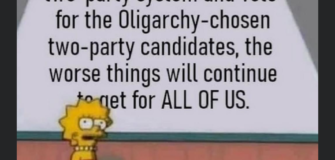Share
Clause Sneaks Poison Pill in Voting Rights Bill (HR1/S1)
By Mike Feinstein, Green Party of California
What happens when a major political party writes an election bill that would reduce minor party competition and further entrench a duopoly? That’s what is happening right before our eyes, with the Democratic Party and HR1/S1 – the ‘For the People Act’.
While HR1/S1 contains incredibly important and urgent voting rights protections that Greens enthusiastically support, the bill also contains a clause that would drive smaller parties like the Green Party off the ballot.
This isn’t surprising, because Democrats have long pursued legal challenges to deny Green candidates a place before the voters.
But what makes HR1/S1 so hypocritical, is that the same principle it righteously applies in favor of needed voting rights protections, it does not apply to protecting voter choice.
HR1/S1 supporters correctly argue that election laws enacted by Republican-controlled state legislatures have a disproportionately negative impact upon communities of color and other traditionally marginalized groups – and that HR1/S1 needs to override these laws with guaranteed federal protection for voting rights.
But when changes in HR1/S1 to the federal presidential campaign financing system would have a disproportionately negative impact on minor parties and voters that support them, these same supporters feign ignorance and look the other way.
Perhaps HR1/S1 is designed to convey partisan advantage to the Democratic Party?
HR1/S1 would raise the threshold to receive presidential primary matching funds, to put it out of reach of most minor party presidential candidates. Not only would this substantially weaken their campaigns, but it would mean they and their parties will also have a harder time getting on the ballot.
Onerous state ballot access laws passed by Democrats and Republicans mean minor party presidential candidates already often have to qualify themselves and their parties via expensive petition drives, on an election-by-election, state-by-state basis. These petition drives are supported in many cases by matching funds — a practice long recognized by Federal Elections Commission Advisory Opinions as proper use of these funds.
Without matching funds, minor parties and their presidential candidates are unlikely to appear on the general election ballot in many states. Without state party ballot status, neither may many minor parties, down-ticket state and congressional candidates. Also in many states to maintain party ballot status, minor party presidential candidates must receive a certain percentage of the general election vote. But they can’t if they aren’t on the ballot.
As a result, minor parties will begin to disappear under HR1/S1 — clearing the field for the major parties — at the same time polls show support for a third party in the U.S. at an all-time high.
In a cynical and misleading response (that was forwarded to the Green Party), Common Cause — which co-wrote the campaign finance section of HR1/S1 — said this to a Common Cause member who wrote to them concerned HR1 would hurt minor parties:
Hi Claire,
Thanks for your email. The claim that H.R. 1/S. 1 disadvantages third parties are untrue — the bill treats all parties equally….The update to the qualifying threshold is merely modernizing the presidential small donor system to account for inflation and the increasing costs of presidential campaigns.
This is an incredible statement to make for a national organization that stands for voting rights and integrity in government. Just because a bill may treat all political parties equally, doesn’t mean it won’t disadvantage some compared to others in the process!
Cynically, the Common Cause letter employs the same sleight-of-hand reasoning as used by Georgia Republicans in adding a voter identification requirement to the process for requesting an absentee ballot, after previously only requiring voters to sign an application, and simultaneously shortening the time frame to request a ballot. “It treats all voters the same” supporters of the Georgia law said while ignoring the well-known disparate impact of the requirement upon communities that disproportionately lack the requisite ID or access to getting them.
In the case of HR1/S1 and presidential primary public matching funds, Federal Election Committee records show that the current threshold to qualify can be reached by presidential nominees of several minor parties. By raising the threshold beyond the reach of most minor party candidates, will clearly and unequivocally disadvantage third parties and voters who support them. So what Common Cause is saying is not true.
A few weeks before S1 was expected to come for a floor vote in the U.S Senate in late June, at issue was whether the bill would have the full support of all 48 Democrats and the two independents that caucus with them. The thinking was if that was the case, then an argument could be made to waive the filibuster rule to pass it in the Senate by a simple majority vote (i.e. the 48 + 2, plus a tie-breaker by Vice-President Kamala Harris), as the bill faced vociferous Republican opposition and was not expected to receive any Republican support, certainly not the ten votes to reach the 60 needed to override the filibuster.
Instead West Virginia Senator Joe Manchin said he did not support many parts of the bill and wanted to negotiate a smaller bill aimed more directly at voting rights but without as many other election reforms. In response, Senate Democrats put forward a resolution to simply open debate on amending S1, which all Republicans opposed. Afterward, Democrats said they would continue to fight to pass voting rights reform. Manchin stated he was against the new Congressional public financing section of HR1/S1, but did not state whether he supported or opposed the new presidential matching funds system that would have the effect of harming minor parties.
The Green Party’s position has been to seek amendment of the bill so that the existing presidential matching funds thresholds remain in place. Greens want the voting rights protections in HR1/S1 to pass, but not the hatchet job on voter choice.
1 Comment
-
Pingback: August 8, 2021 – Progressive News Service





